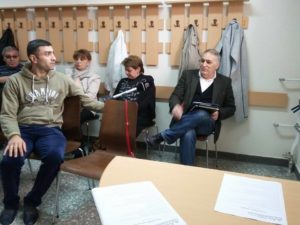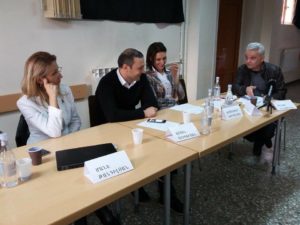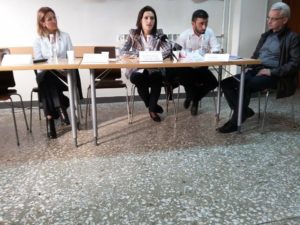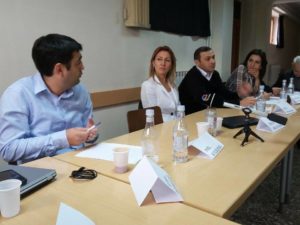A one-day conference, titled “Armenia’s 2017 elections: A look from within and the Diaspora,” took place on October 22nd, in Gyumri, dedicated to Armenia’s Parliamentary elections to be held in spring. It was organized by the ANI Armenian Research Center.
In the spring of 2017 Armenia has parliamentary elections, which will be the first elections after 2015’s referendum on constitutional amendments.

The papers presented during the conference as well as subsequent discussions sought answers to the questions noted below.
Is it possible to hold free and fair elections in Armenia? What steps should be taken in this direction?
What are the obstacles hindering the organization of fair vote?
What is the role of the Diaspora and does the Diaspora have commitment towards Armenia’s political life? What ways of election frauds ensure the authorities’ successive victories?
How to learn from Georgia’s experience to hold relatively free elections?
Can the opposition unite, what are the factors that hinder the unification?
Finally, is it possible to change the government in Armenia through constitutional means – the elections, and if not, then what is the way out of the vicious circle and WHAT TO DO?

The Civilitas Foundation Expert and ANI Armenian Research Center Coordinator Tatul Hakobyan, opening the conference, presented the history of Armenia’s Nationwide Elections since 1990s. He briefly spoke of the peculiarities of the 6 parliamentary, 6 presidential elections and 3 Constitutional adoption or reform votes since Armenia’s independence, and how they remained in the memories of experts and politically active community.
Bright Armenia Political Party Council Secretary Mane Tandilyan presented the obstacles to organizing a fair vote. She noted that despite there being numerous obstacles, one should not exclude the possibility of a fair vote. Tandilyan presented the short and long term solutions. She especially emphasized the unification of the ideological, opposition parties ahead of 2017 elections.

Architect Ivan Ardhaldjian highlighted the importance of the role of individuals. He spoke of a number of people who have made a breakthrough by their actions and made history. During the 2015 Constitutional referendum Ardhaldjian was an observer. The NO had won in that precinct, but the results were changed in favor of the YES by a fraud. Ardhaldjian had revealed the fraud and made it public, although both he and his party, the ARF, were promoters of YES.
Civil Contract Party Vice President of the Board Lena Nazaryan spoke about the role of local government elections in the context of national reforms. She noted that a number of factors, including the lack of financial resources, do not allow the opposition to participate fully in local elections. In addition, it’s not easy to find people in the regions, who will participate in the elections as candidates of the opposition. Therefore, the local elections are generally won by Republicans or non-partisans who become Republican after being elected.

Armen Grigoryan from Transparency International spoke of the role of the observers’ mission in 2017 parliamentary elections, indicating that TI, together with the Citizen Observer, plan to have about 4000 observers. Grigoryan said that democracy has no alternative in Armenia. If we had democracy, we would not have the Daredevils of Sasun. He noted that if the door of Daredevils of Sasun is closed in the neighboring Georgia, the same cannot be said about Armenia.
Stepanakert Press Club Chairman Gegham Baghdasaryan presented the peculiarities of NK’s quarter century electoral experience. Baghdasaryan said that the elections in NK are free but not fair, because the administrative resource does its dirty work. Baghdasaryan presented the details of the 1990s history of NK elections, in particular, how the Levon Ter-Petrosyan team supported Robert Kocharyan and Serzh Sargsyan against ARF, which had come to power through legitimate elections in NK.
Arsen Kharatyan, Georgia’s Armenian-language ALIQ Media Chief Editor, presented the report “Georgia’s national minorities and the 2016 parliamentary elections,” giving a brief outline of Georgian national elections since 1990, time periods of Zviad Gamsakhurdia, Eduard Shevardnadze, Mikheil Saakashvili and Bidzina Ivanishvili. Kharatyan noted that, unlike Armenia, the political discourse is more complicated in Georgia, especially in intellectual sense.

CivilNet’s Political Commentator, anchor Derenik Malkhasyan presented “The Opposition City Reputation and the experience of nationwide elections in Gyumri.” Through figures of the previous elections, he showed that except the 2013 presidential election, where the opposition leader Raffi Hovannisian held overwhelming victory over Serzh Sargsyan both in Gyumri and Shirak Region, in all the other cases the ruling party has defeated the opposition. Malkhasyan said that if the opposition does not unite ahead of the 2017 elections, the authorities and their satellite parties will be able to occupy the greatest part of the new parliament, with no serious violations and election fraud.
GALA Party Board Member Armenuhi Vardanyan spoke about the reasons why the opposition did not unite in Gyumri local elections of October 2. That was the cause of their loss (including GALA) for the most part. But Balasanyan’s ruling alliance also lost, because, according to Vardanyan, the way which Balasanyan remained Gyumri’s mayor, is not fair and legal.
Summing up the conference, Tatul Hakobyan said that ANI Center will be organizing another conference-debate, to understand whether the unification of the opposition ahead of the 2017 parliamentary elections is a possibility.











